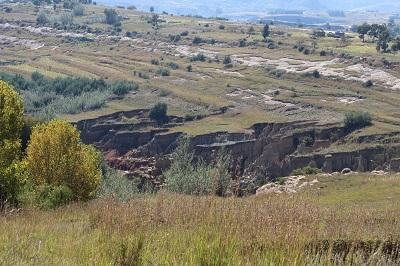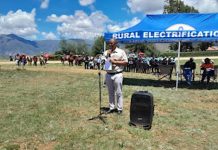Africa-Press – Lesotho. In a move to counter the effects of climate change and ensure climate resilience, the government has vowed to boost the early warning systems to safeguard lives and properties. This comes as the escalating threats posed by climate change are becoming a regular feature in Lesotho.
This the Minister of Finance and Development Planning Dr Retšelisitsoe Matlanyane recently told the parliament.
The early warning systems are expected to provide timely information on weather events and also inform the farmers on the type of the crops they can plant. Early warning systems are reliant on data collection and meteorological forecasting so that regular alert messages are transmitted to the communities and farmers alike to act accordingly.
When effectively implemented the early warning systems ensure that there is proper mobilisation of the renounces and the disaster response strategies.
In recent years, Lesotho has endured a series of natural disasters, including floods and violent winds that have swept through many households, causing significant damage to infrastructure, particularly roads and bridges. The country has also experienced prolonged droughts, which have severely affected harvests and animals and also exacerbated the food insecurity.
Dr Matlanyane stated that the government has earmarked M135 million to address the cross-cutting issues which include climate change issues, improvement in early warning systems, regeneration of landscapes and livelihoods, integrated shared management. The Minister further promised that national adaptation processes will be streamlined.
The Minister in the Prime Minister’s Office, Hon Limpho Tau also mentioned that the M75 million budget allocated to the Disaster Management Authority (DMA) will address disasters as it will strengthen the early warning systems.
Hon Tefo Mapesala has proposed that the government should consider the value of indigenous knowledge in tackling climate change.
He argued that the Indigenous communities have long relied on traditional methods of weather prediction. These communities monitored the environmental behaviours using natural signs such as animals signs behaviour, change in wind patterns.
The United Nations University Institute for Environment and Human Security (UNU-EHS) study highlights how the localised strategies enhance food security and water management in a changing climate.
Ancient communities reportedly practiced rotational farming techniques, which allow land to regenerate and these have been proven by modern science to preserve soil degradation. The agroforestry which combines trees and crops, was also practiced and it preserves biodiversity and prevents soil degradation.
Another MP, Dr Pinki Manamolela showed how the natural disasters create havoc to the environment saying many bridges have collapsed owing to the natural disasters.
She advocated for strong infrastructure of roads and bridges.
Dr Manamolela also called on the government to join forces with the Ministry of Health to protect the nation’s lives. She further highlighted that there should be collaboration with the Ministry of Agriculture for sustenance and ensuring food security.
An MP, Prof Nqosa Mahao noted the climate challenges and also announced his support for the indigenous knowledge in response to the climate change. He told the parliament how his wheat had been attacked by the birds and called the “person who knows how to architect” and there is no longer that outbreak of birds.
Meanwhile the early warning systems have been touted as the good approach that not only improves response times and preparedness but also strengthens the resilience of communities that have often been left on the margins of climate action.
For More News And Analysis About Lesotho Follow Africa-Press






